Immigrants say
‘Let us work’
When he came to the United States in the 1980s, he was looking for opportunity and work. Severiano Hernandez, originally from Oaxaca, Mexico, earned his green card, his driver’s license and eventually worked his way up to becoming a U.S. citizen.
For the past 15 years, he’s worked at Wiers Farm — a 117-year-old produce operation near Willard, Ohio. Today, he holds the title “crew leader” and oversees about 110 field workers. Most of his immediate family works on the farm, including his wife, his parents, a daughter and two sisters. His income supports his family, which includes two young children.
“I have a good job and I make some money and I take care of my family,” he said. “And they’re (Wiers family) good people.”
Hernandez has a house near Willard, and in Mexico. His family makes the 65-hour drive back home about every two years.
Looking back
Nearly 30 years since he came to the United States, he says Hispanics are coming today for the same reason: to work and take care of their families. But increased border security and laws that allow workers in the States only seasonally have made that a challenge.
Sources like the Pew Hispanic Center and U.S. Department of Homeland Security put the number of undocumented workers in the United States at about 11 million. Hernandez wants people to be able to work here legally, like he did, but also be able to go back to Mexico to visit their families.
“If people come here, they work hard,” he said. “I’d like people to have the same kind of (opportunity) like me. The only thing we do here is work — that’s the only thing we do here.”
It’s fitting that Hernandez would end up at Wiers Farm — a place that was also started by immigrants. In 1896, Henry Wiers and other Dutch immigrants bought the farm’s first five acres in a low-lying area known for its swamps and black muck. The family worked to build ditches and drain the land, steadily adding more acres.
Today, the Wiers family farms more than 3,000 acres of produce and employs 500-600 people during the growing season.
“For the people, they’re looking for a way to better their lives,” said Ben Wiers. “Let’s face it, my great-grandfather (Henry Wiers) came to this country and worked in these fields, doing the same jobs that these folks are doing today, and for the same reason: to better their lives. And eventually he was able to expand his farm and add people and all of that.”
Carlos Iracheta, 36, has worked more than 10 years at Wiers Farm. He is a U.S. citizen from Brownsville, Texas, and his parents are U.S. residents, originally from Metamoros, Mexico.
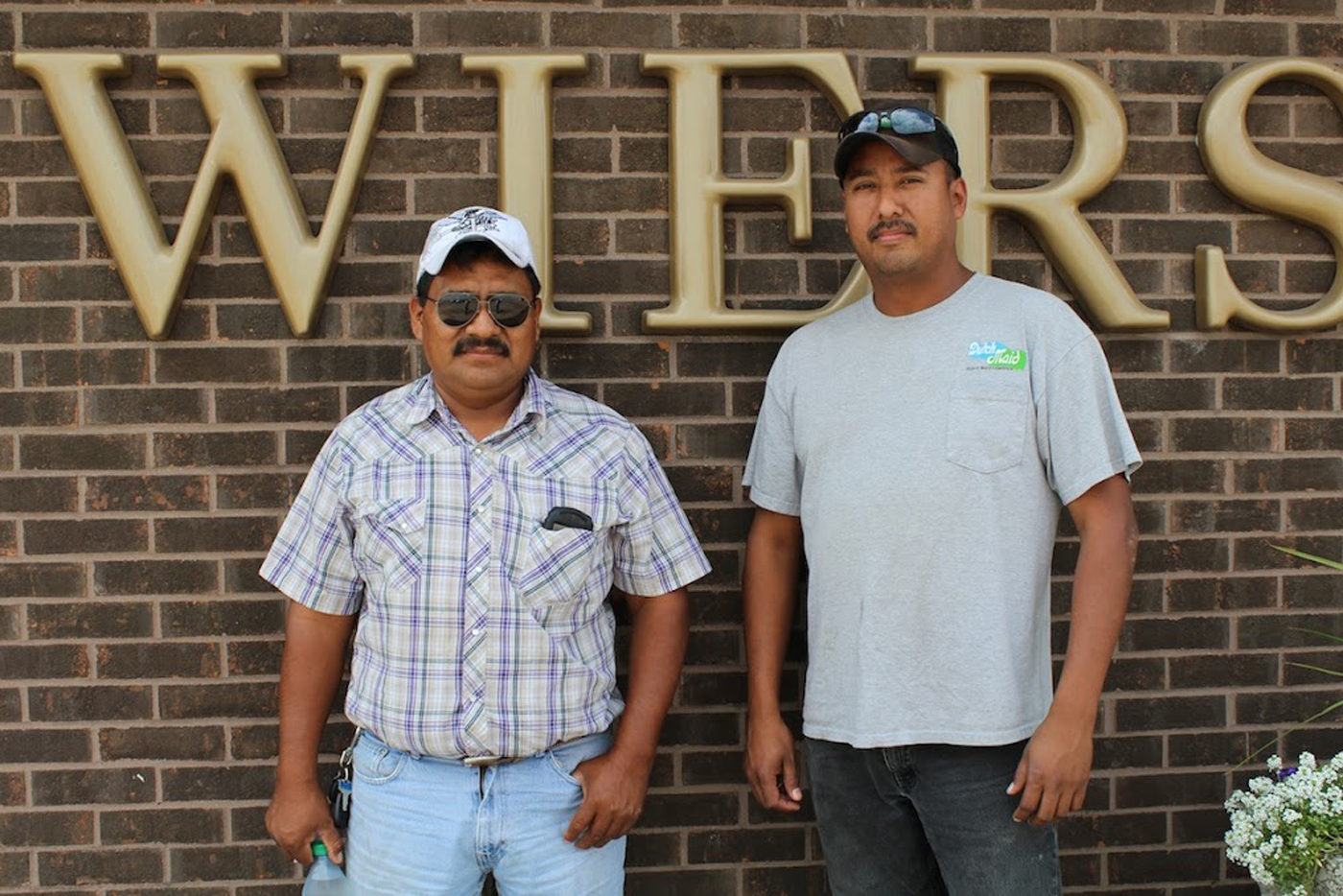
Severiano Hernansez (left) and Carlos Iracheta have each worked at Wiers Farm near Willard, Ohio, for more than 10 years. They are both U.S. citizens.
He’s now the farm’s inventory and greenhouse manager — but it took him a while to earn that position. Like most beginners, Iracheta started as a field worker, and moved his way up to inside jobs like stacking, operating a forklift and working on the loading dock.
When he came to the farm, Iracheta lived in one of the Wiers’ labor housing camps — an apartment-like complex that provides utilities and living quarters. Today, he has his own house.
“I started at the bottom … and eventually I just kept going up and up,” he said. Iracheta works at Wiers Farm from March through October. His two children, 8 and 11, usually stay with him, and the three travel back to Texas in the fall, where his children attend school.
Over the years, he has gotten to know the Wiers well and has been invited to their houses for dinner and social events.
“They (Wiers) care about what the people go through,” he said. “It’s basically family oriented. That’s why I keep coming back, I guess. I like my position.”Like Hernandez, Iracheta says immigrants are here to work, and the government needs laws that let the people work.“Just let them work,” he said. “That’s all they want to do — they just want to work.”
Work ethic

Hispanics are known for their willingness to work and do jobs that Americans refuse. They put in long hours and work in all kinds of weather.
And work they do — sometimes 10 or more hours a day — depending on the time of season and the weather. In the spring, they plant. During the summer, they maintain the crops by pulling weeds and cultivating. Late summer and fall, they harvest.
Workers at Wiers Farm grow 40 different kinds of vegetables — radishes, cucumbers, corn, carrots, cabbages and what seems like everything else. ”It is hard work. It’s farming,” said Iracheta. “It’s not a factory.”
There are three breaks a day. A restroom facility is provided for about every 20 workers — typically a portable unit that is set up in the fields. Hand-washing stations are available for all workers — and they’re expected to use them, as a food safety measure.
Some days get hot — really hot. The dirt at Wiers Farm is mostly black muck — which absorbs heat. A 90-degree day can be 100 degrees or more in the fields. The workers adjust by wearing loose-fitting clothing, and taking water wherever they go.
Opinions abound
Some Americans say immigrants like Iracheta are taking American jobs — a claim he knows very well. But, he doesn’t buy it.
“I laugh,” he said. “They’ll come and then they’ll work for a day or two and then that’s it.”
While there are some locals who do show up and work hard — many more do not and quit after a day or two.
“A lot of these folks are just not interested in a job that you have to work either if it’s raining, if it’s 100 degrees,” Wiers said. “You’ve got all different types of weather (and hour) issues.”
Wiers said he “respects the fact that local people aren’t looking for these types of jobs.” But because of that, farmers like him need immigrants who are willing to do the work.
“We need a secure, safe labor force that they (immigrants) don’t have to risk their lives to cross the border, (and we need to) know we have enough people to harvest the crops,” he said.
When the workers are done for the day — typically late afternoon or evening — they’re free to do what they want. Depending on the occasion, they might get together at a family member’s house for a meal, or go into town for supplies or to do laundry.
In a town that is mostly white, the workers’ darker complexion and Spanish accents make them easy to spot. Stereotypes range from whether they’re legal, to whether they’re taking jobs.
“Me being a U.S. citizen, I’ve been harassed,” Iracheta said. “I (give) a ‘yes sir, no sir, yes sir,’ they let me go.’”
Some workers, Iracheta said, are afraid to go out into the public. But Iracheta said for the most part — it’s actually not that bad.
“I guess they (locals) got used to seeing us around,” he said.
It helps that the workers — when they do to into the public — are buying products from American stores and American services. Some start their day buying breakfast in town, and buy everything they need off the locals.
“We like to spend money,” Iracheta said, lightheartedly. “I mean, we like to save, but at the same time we like to spend.”
The Wiers family provides a full-size soccer field for their workers and their families — some who play on a traveling team, which includes two of Ben Wiers’ daughters.
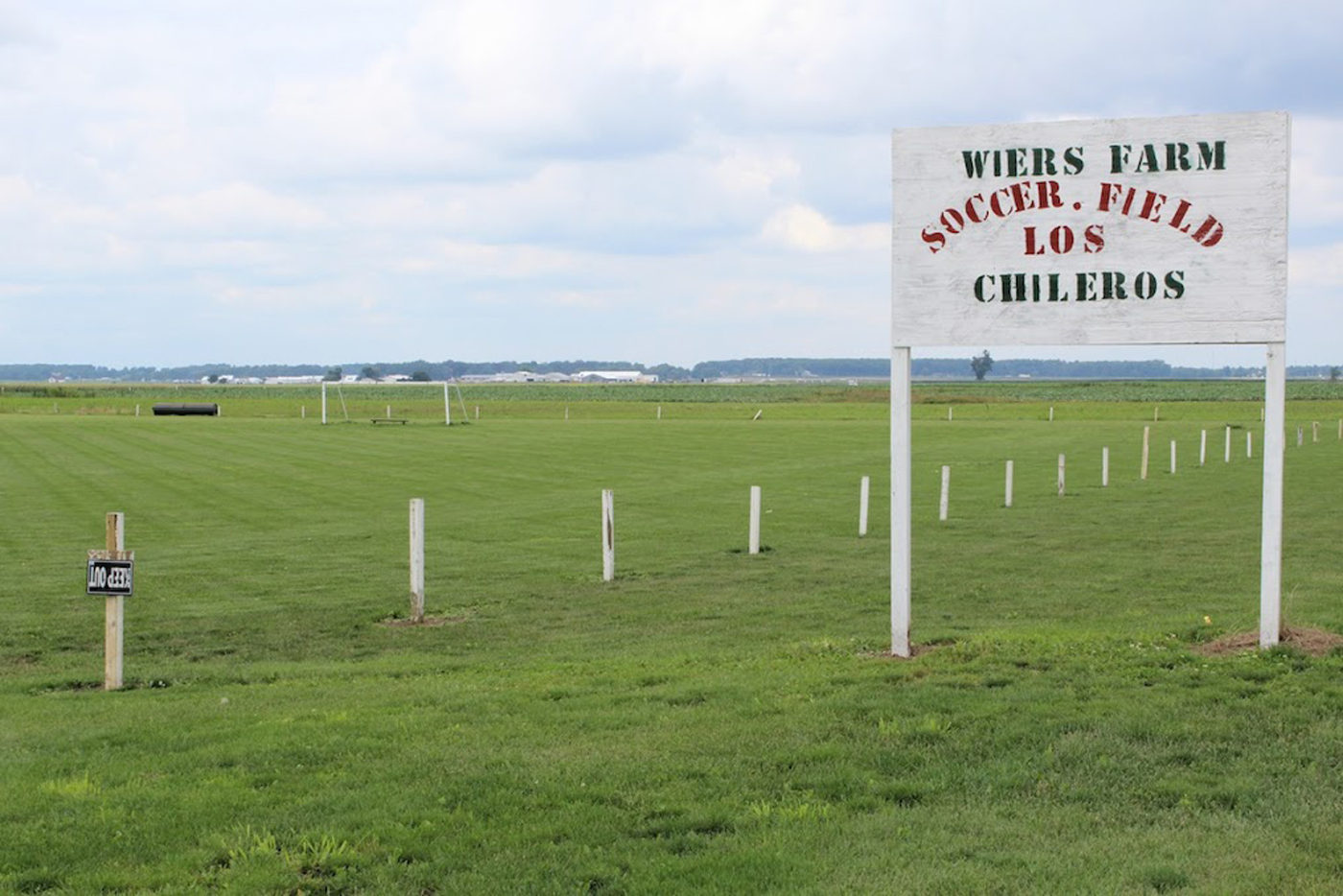
Wiers Farm provides a soccer field for its workers, a popular sport among Hispanics.
And they provide an ombudsman — so if a worker has a concern and doesn’t feel comfortable approaching the Wiers, the worker can still talk to someone.
“We want to take care of the people,” Ben Wiers said. “The people are the key to our success.” Most of the workers are Catholic and many take part in local church services, some which are provided in Spanish.
Social perspective
Wendy Tarr, of Columbus, has an extensive background with the social issues immigrants face. She is the Midwest regional organizer for Bibles, Badges and Business — a national network of faith, law enforcement and business leaders working together to educate members of Congress about immigrants.
Tarr said Hispanics are often mischaracterized because they’re not understood.
“They (immigrants) really want to succeed and they see this as the land of opportunity,” Tarr said. “The more that people have engaged with immigrants, the more that is obvious.”
“Engaging” them is what makes the difference, according to Shelby County farmer Chris Gibbs. Although he does not employ immigrants, Gibbs supports reform because he knows farmers who do employ immigrants, and who need the labor force.
“It’s very easy for folks to throw rocks at immigration reform when they can’t look who immigration reform is about in the eye,” he said. “If you’re standing in front of them and they’ve got a heart beat and they’ve got a grandma … it brings the debate down to a human level.”
Gibbs is chairman of the Shelby County Republican Party. He made a trip to Washington in late October, alongside other farmers and some lawmakers, including Ohio Rep. Terry Boose of Norwalk, to tell lawmakers why reform is needed.
The event was called “Americans for Reform.” It was one of dozens of similar efforts made by private citizens who want a new system.
Dairy farms
It’s not just vegetable growers who want change. Chris Weaver and his family employ about 35 Hispanics on their dairy operation in northwest Ohio and Indiana. They’ve tried to hire locals in the past, but most of the time, Hispanics were more dependable.
He describes them as “good workers and they apply themselves.”
They show up for work, and they’re not afraid to get dirty. And they take care of their surroundings — including the housing facilities Weaver provides.
He requires paperwork and documentation from those he hires. He also requires a drug test — something Hispanics tend to pass more often than locals.
But, Weaver knows there are other Hispanics who are living in fear. Congress needs to “create a system that allows Hispanics to work here and, in a sense, come out of the shadows if they’re working in the shadows,” he said.
Take action
At the same time, Weaver said Congress needs to make up its mind.
Congress should either “clamp down on everything and be hard on everyone at the same time,” he said, “Or — if they’re (Hispanics) here and trying to work the American dream and they’re willing to work and contribute to society — let’s let them.”
Immigrants like Iracheta and Hernandez, who are both citizens, hope Congress does the second thing — let people come here to work. And, let them go home once in a while, to visit their families.
“I’d like the people to go to Mexico and see family and come back and work again,” Hernandez said, recalling how he did just that, for many years.
The workers enjoy their jobs, the people they work with and, most of all, the chance to succeed.
“I love working here,” Iracheta said. “If not, I wouldn’t be here.”
“I’d like people to have the same kind of (opportunity) like me. The only thing we do here is work — that’s the only thing we do here.”Severiano Hernandez
Where they stand
Farmers:
We need the help
“We need a secure, safe labor force that they (immigrants) don’t have to risk their lives to cross the border, (and we need to) know we have enough people to harvest the crops”Ben Wiers
Where they stand
It takes a lot of people to plant and harvest the produce at Buurma Farms. This 2,500-acre operation — which includes a farm in Gregory, Mich., and Willard, Ohio — produces 30 crops.
The farm’s sweet corn, peppers, radishes, cauliflower and dozens of other crops are all labor intensive and require hands-on work.
During the summer, the farm employs upward of 500 people, most of whom are of Hispanic descent. And the farm needs each one — sometimes even more. “Everything we do has to be run by human hands,” said Bruce Buurma, the farm’s field manager.
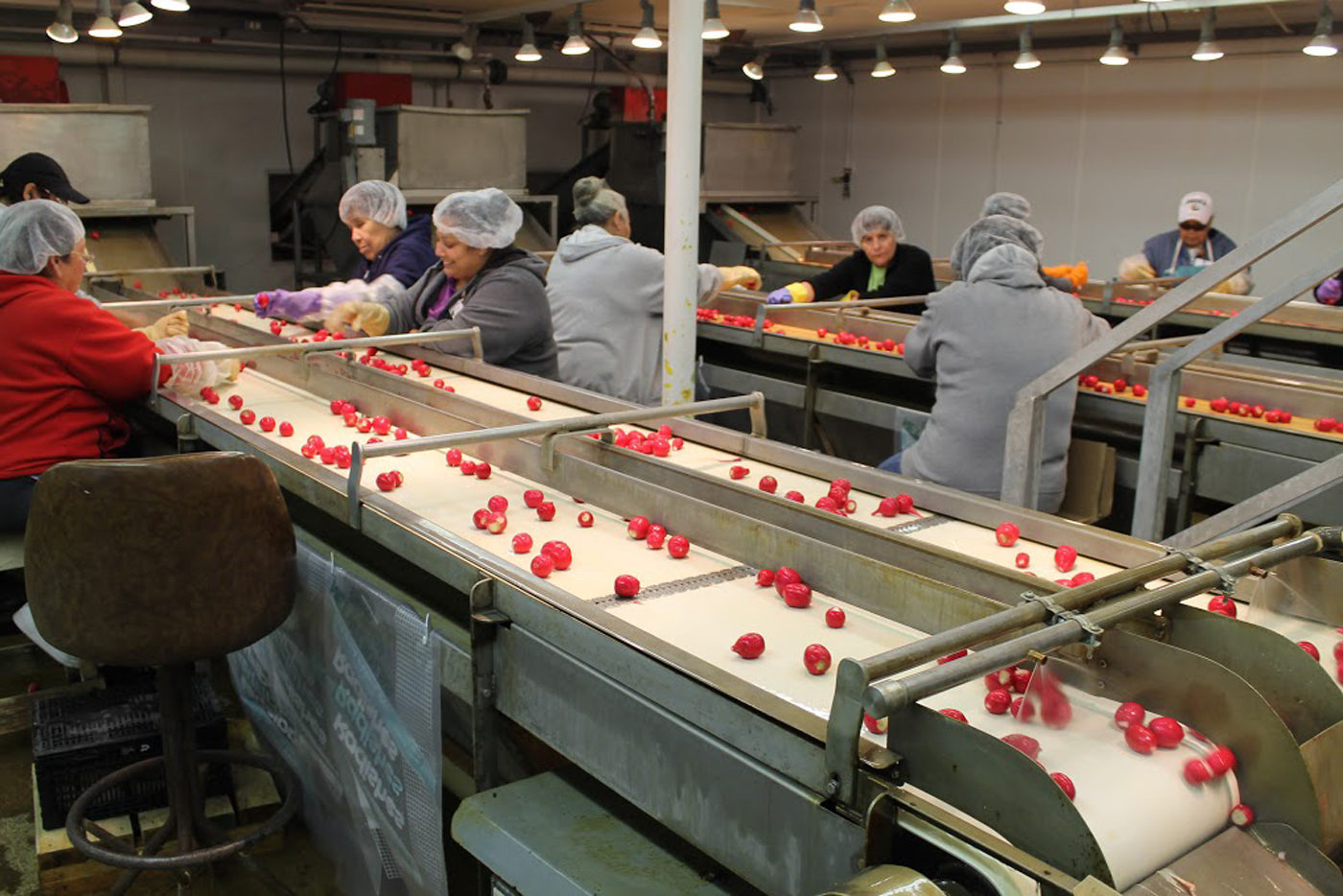
Workers sort radishes at Buurma Farms near Willard. The farm spans 2,500 acres and employs 500-600 people during the growing season.
Finding work
But getting those human hands isn’t easy. Government regulations slow the process, making it difficult to get employees on the farm when they’re needed.
The nation’s current guest worker program — known as the H-2A Temporary Agricultural Worker Visa — is cumbersome and allows only for temporary employment — usually on a seasonal basis.
The employer must file an application with the U.S. Department of Labor, stating there are not sufficient local workers who are “able, willing, qualified, and available,” and that the “employment of aliens” will not adversely affect the wages and working conditions of U.S. workers with similar jobs.
“It takes a lawyer to fill it out,” Buurma said.
Long delays
And, you had better request the workers long before you need them. He said it can take a month before workers are approved — too much time when dealing with produce.
“With vegetables, the day you need to pick them is the day you need (the help),” he said.
Buurma should know. Just last year, he had to let some sweet corn and other crops go unharvested because he didn’t have enough help. He lost profits, and someone lost income he or she could have earned.Buurma is one of many farmers across the nation who are pressuring Congress to reform the U.S. immigration system so farmers can get workers when they need them.
What about Americans?
At first glance, it might seem that farmers should be hiring more locals. The U.S. Department of Labor reported there were about 10.9 million unemployed people in the country in November — close to the same number of undocumented immigrants reported by the Department of Homeland Security, at 11.5 million.
But, getting those same unemployed U.S. citizens, or even a majority of them, to do farm labor is often impossible.“We’ve got a society of dependent people who are not willing to work, as long as someone else is willing to feed them,” he said.
Buurma has reached out to the unemployed community in the past, one year hiring 35 people as part of a government program that paid him $750 per person just for giving them a job. Of the 35, he said 15 showed up, 11 made it to the field, and all but two quit or walked off on the first day.
“Most of them were standing around talking on cell phones,” he said.
The weather was mild — mid 70s — and the task was to pull weeds from parsley — one of the less difficult jobs on Burrma’s farm.
“One guy said, ‘I’m going back to jail — jail is better than this,’” Buurma said.
Although the farm work can be demanding, it’s also rewarding. Most of Buurma’s harvest crews are paid $11-$17 per hour, based on how much they harvest. They also receive free rent and utilities as part of a labor camp package. The camps, which are similar to apartments, are state and federally inspected and include all the basic utilities as a house.

A labor camp at one of the produce farms in Celeryville, Ohio, where farm workers live.
The Buurma family also provides a community health center on the farm, in which the workers pay a nominal $10 for a doctor’s visit. The majority of the workforce comes back each year — at will — with some families now in their second or third generation of working on the farm.
In the parlor
Dairy farms are also struggling to get workers. Chris Weaver and his family milk cows in northwest Ohio and in Indiana, where they employ about 35 people from South America.
The reason? They work hard, they show up and they can pass a drug test.“Hispanics, generally, have been the only individual we’ve been able to get on the dairy,” Weaver said.
Weaver said his farm does drug tests to meet the requirements of Workers Compensation. The biggest drug issue tends to be with the U.S.-born. “We’ve had a lot of issues with drug issues and just getting them (locals) to come to work day after day,” he said.
Price of food
It’s not just labor that’s at stake.
So are food prices — prices that historically have been kept low because of an abundant labor supply. But Buurma warns that if labor doesn’t keep up, prices will rise, because the crops aren’t being harvested.
Buurma has already seen local examples of price increases, including cauliflower, which has increased $5 a head.
“You’re going to see that with all your fruits and vegetables,” he said, adding that higher prices are “guaranteed.”
On the same road as Buurma’s Willard, Ohio, farm, is another large produce operation — Wiers Farm. Both farms date back to 1896 — when they themselves were founded by Dutch immigrants.
Although they are competitors when it comes to selling, both farms are in the same boat on the issue of labor shortages. Ben Wiers, president of Wiers Farms, said if the U.S. cannot get the labor it needs — the country will end up importing its food.“You’re going to do one or the other,” he said.
Like Buurma, Wiers knows what it’s like to fill out an H-2A application. This past year, the average delay between when Wiers asked for an employee and when he got one was 22 days.
“Our particular industry, that means I’ve lost a lot of product,” he said. “We need something that we know we’re going to have the workforce we’re looking for, the numbers that we’re looking for, and they’re (workers) going to be here at a time when the crop needs to be harvested or planted.”
Border security
The past few years have been more difficult on farmers, as the government has increased its border security and deportation rate. In 2012, the U.S. Immigration and Customs Enforcement conducted a total of 410,000 removals, setting a new record.
In 2013, 369,000 removals were conducted. The leading countries of origin were Mexico, Guatemala, Honduras and El Salvador.
The result is fewer farm employees and just as much work.In many cases, Hispanics are returning to their country to settle an estate or to visit family and they’re unable to come back.
“The border has been shut down so tight that they can no longer get across,” Buurma said.
While there is disagreement on what kind of status to give undocumented workers, there is widespread agreement by most major farm organizations that workers who are already in the United States should be given the opportunity to stay.
Legislative action
The U.S. Senate approved a comprehensive reform bill in June, by a vote of 68-32, that would have provided the nation’s 11 million undocumented immigrants a path toward citizenship.
The bill, which died because it was never taken up by the House of Representatives, would have allowed the workers to first become legal by meeting the requirements of a Blue Card (working 100 days or 575 hours in the United States), and after a minimum of five years, the worker could have obtained his or her green card.
The bill also sought to form a new guest-worker program — one in which the worker would either be employed “at-will,” and could move to the most favorable job at his or her own will, or be “contract-based,” meaning the worker would enter into a contract with a particular employer.
How many rights
But there is much debate over exactly how many rights foreign workers should have, and to what extent they should be granted citizenship.
House Republicans, including Speaker John Boehner, R-Ohio, criticized the Senate bill for being too broad and called for something that would address the different issues within immigration, piece by piece.
They refused to take up the Senate bill, saying instead that the House would continue its work on a “step-by-step, common-sense approach.”
Blame game
The statement, released by Boehner and other top House Republicans, blamed the “Democratic-controlled Washington” for enacting what House leaders called “a single, massive, Obamacare-like bill.”
Boehner, in particular, has said securing the border should be Congress’ first priority on immigration. He argues that a secure border aids in the protection against terror attacks, and is an important part of enforcing existing immigration laws.
“America is a nation of immigrants, but we are also a nation of laws — those laws must be obeyed and enforced,” he said in a released statement.
He also pledged to ensure that taxpayer-funded benefits do not go to illegal immigrants.
“I will continue to fight against any attempts to give illegal immigrants benefits that are paid for with your tax dollars,” he said.
Farmers like the Wiers and Buurmas are used to the political battle. It’s been going on for years, but the results are starting to be felt.
“How do I order seed for next year when I don’t know if I have anybody to harvest it,” Buurma asked.
An answer will only come if Congress can agree on something.
And, while the House has not yet introduced its own immigration bill, there was renewed hope at the close of the year when Boehner hired Rebecca Tallent, an immigration policy expert.
Tallent had served as chief of staff to Sen. John McCain, R-Ariz., and was involved in efforts to pass immigration reform in 2006 and 2007. Republicans who support immigration reform said she is a great choice and a sign the House is still considering the issue.
After countless trips to Washington, writing letters and giving speeches, farmers can only hope.
“I understand how slow the process is, but I do have optimism, whether it’s the next two to five years, something will happen,” Wiers said. “I hope that both parties can get together and come up with a solution that’s workable, that keeps us on the forefront of competitiveness in the United States, and allows us to provide these food sources — whether it’s in the dairy industry or the vegetable industry or the fruit industry.
“We all need this labor.”
STAY INFORMED. SIGN UP!
Up-to-date agriculture news in your inbox!


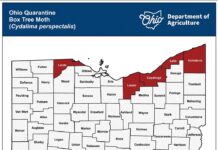







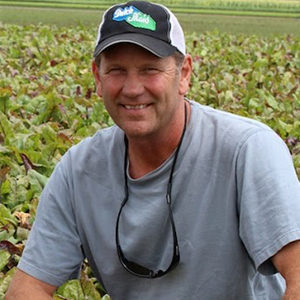

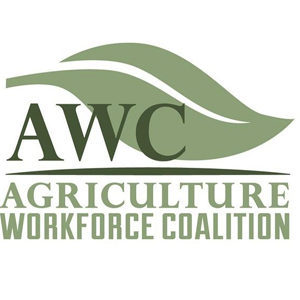




This is a very good story that should be told and understood. Nice job.
Treat Others The Same Way You Want To Be Treated…With Respect At Home,School, and Work; In Sports, Sportsmanship, On The Computer-Phone, Within The Community, And Throughout The World. “Understanding And Appreciating Differences In Other People.
–Willard Community Diversity “Quality of Life Council/ & Golden Rule Masonic Lodge-Chapter-Council/ Willard,Ohio.
–Marty Sowers, President of the Willard Community Diversity “Quality of Life” Council.
Thank you, Marty, for the feedback. This continues to be a big issue across Ohio and the nation and I look forward to continuing the coverage.
Chris